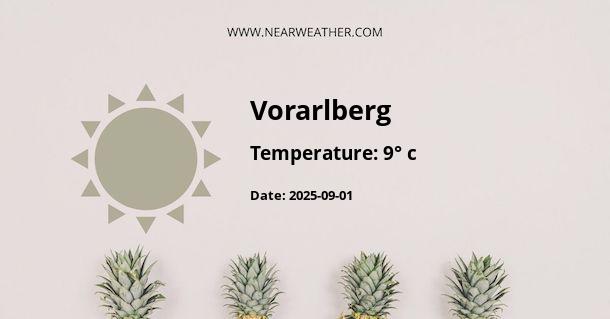Vorarlberg, Austria: Climate and Weather Year Round
Vorarlberg is a picturesque region located in the western part of Austria. It is known for its stunning Alpine landscapes, charming villages, and rich cultural heritage. The climate in Vorarlberg is influenced by its geographical location, with the majestic Alps to the south and the Rhine Valley to the north. The region experiences a diverse climate throughout the year, with distinct seasons and varying weather patterns. Let's explore the climate and weather conditions in Vorarlberg in more detail.
Spring (March to May)
Spring in Vorarlberg is a time of transition, as the region emerges from the cold winter months. The weather gradually becomes milder, and nature starts to awaken from its slumber. In March, temperatures range from 0°C to 8°C (32°F to 46°F), with occasional snowfall still possible. As spring progresses, temperatures rise steadily, reaching an average of 8°C to 15°C (46°F to 59°F) in April and 13°C to 20°C (55°F to 68°F) in May. Rainfall is moderate during this season, with around 10 to 15 rainy days per month.
The landscapes of Vorarlberg come to life during spring, with colorful blooms and blossoming trees. It is an ideal time for outdoor activities such as hiking, cycling, and exploring the region's natural beauty.
Summer (June to August)
Summer is a popular time to visit Vorarlberg, as the region experiences pleasant weather and longer daylight hours. Average temperatures range from 15°C to 25°C (59°F to 77°F), with July and August being the warmest months. During these months, temperatures can reach up to 30°C (86°F) on hotter days. The nights are generally cooler, providing relief from the daytime heat.
Summer in Vorarlberg is characterized by abundant sunshine, with an average of 8 to 9 hours of sunshine per day. The region experiences some rainfall during this season, but it is usually brief and scattered. It is a great time to engage in outdoor activities such as swimming, hiking, and mountain biking.
Autumn (September to November)
Autumn in Vorarlberg brings a beautiful display of colors as the leaves on the trees change from green to shades of red, orange, and gold. The temperatures begin to cool down, with September still experiencing mild temperatures ranging from 12°C to 19°C (54°F to 66°F). As the season progresses, temperatures drop further, averaging around 5°C to 12°C (41°F to 54°F) in November.
Autumn is also a season of transition when the weather becomes more unpredictable. Rainfall increases, and foggy mornings become more common. It is a great time to explore Vorarlberg's charming villages, visit local wineries, and enjoy the beautiful fall foliage.
Winter (December to February)
Winter in Vorarlberg is a magical time, as the region transforms into a winter wonderland. The majestic Alps are covered in snow, offering excellent opportunities for winter sports enthusiasts. Average temperatures range from -2°C to 5°C (28°F to 41°F) in December and January, with colder temperatures in higher elevations.
Vorarlberg receives significant snowfall during the winter months, creating ideal conditions for skiing, snowboarding, and other winter activities. The region boasts numerous ski resorts, including Arlberg, which is one of the largest ski areas in Austria. The snow-covered landscapes and festive atmosphere make Vorarlberg a popular destination for winter tourism.
Overall Climate
Vorarlberg experiences a humid continental climate, with mild summers and cold winters. The region is known for its microclimates, with varying weather conditions depending on the altitude and proximity to the Alps. The higher elevations receive more precipitation and colder temperatures than the lower-lying areas.
It is important to note that weather can be unpredictable, and conditions may vary from year to year. It is always advisable to check the weather forecast before planning outdoor activities or traveling to Vorarlberg.
Climate Data for Vorarlberg
| Month | Average Temperature (°C) | Average Rainfall (mm) |
|---|---|---|
| January | -2 to 5 | 60 to 80 |
| February | -1 to 6 | 55 to 75 |
| March | 0 to 8 | 60 to 80 |
| April | 8 to 15 | 50 to 70 |
| May | 13 to 20 | 80 to 100 |
| June | 16 to 23 | 90 to 110 |
| July | 18 to 25 | 90 to 110 |
| August | 18 to 25 | 90 to 110 |
| September | 13 to 19 | 80 to 100 |
| October | 8 to 14 | 70 to 90 |
| November | 3 to 9 | 70 to 90 |
| December | -1 to 5 | 60 to 80 |
The climate data above provides an overview of the average temperatures and rainfall in Vorarlberg throughout the year. However, it is important to remember that these are averages, and actual weather conditions may vary.
Conclusion
Vorarlberg offers a diverse climate and a range of weather conditions throughout the year. From the mild and colorful springs to the pleasant summers, beautiful autumns, and snowy winters, each season brings its own unique charm to the region. Whether you are a nature lover, outdoor enthusiast, or a winter sports enthusiast, Vorarlberg has something to offer for everyone.
So, pack your bags and experience the breathtaking landscapes and changing seasons of Vorarlberg, Austria!
A - Vorarlberg's Latitude is 47.250000 & Longitude is 9.916670.
A - Weather in Vorarlberg is -6° today.
A - Climate Conditions in Vorarlberg shows clear sky today.
A - Humidity in Vorarlberg is 74% today.
A - Wind speed in Vorarlberg is 10.69 km/h, flowing at 130° wind direction. today.
